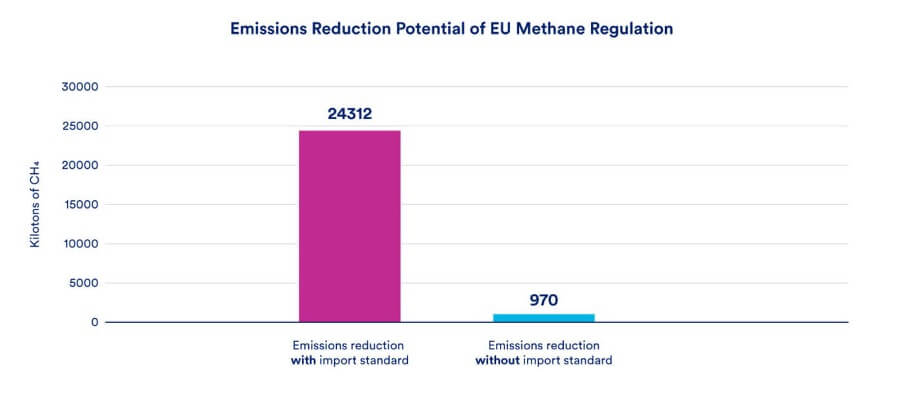
EU agrees to regulation that will dramatically cut EU and global methane pollution
Brussels – Today, the landmark EU Methane Regulation was finalised after negotiations between the European Commission, European Parliament, and Council of the European Union. It is the bloc’s first major methane regulation and is notable for including a groundbreaking new methane import standard that addresses methane emissions from imported oil and gas.
“Considering the prospect of an import standard was nothing more than a dream a year ago, this outcome is a major step forward.” said Brandon Locke, Europe Policy Manager, Methane Pollution Prevention. “While we preferred a faster timeline to reduce emissions before 2030, this agreement will nonetheless go a long way to dramatically cut global methane pollution.”
According to our analysis, a regulation that requires imported fossil fuels to meet the same standards as domestic supplies could achieve a staggering 30% reduction in global emissions from the oil and gas sector, helping partner countries save roughly the quantity of Germany’s annual consumption of gas from being wasted. This import standard, as it has become known, would also improve the lives of more than 10 million people by driving down routine venting and flaring, a contributor to respiratory diseases, premature death, and other negative health effects in local populations.

“The agreement is a positive step forward. The EU has achieved a win today that demonstrates real climate leadership ahead of COP28.” said Alessia Virone, EU Government Affairs Director, “The provisional agreement looks promising, but the devil will be in the details on many important provisions like penalties or leak detection and repair”
Rystad-Energy’s new report, commissioned by CATF, shows that a phased methane import performance standard could be implemented as early as 2027, and would reduce emissions associated with oil and gas imports by at least 1.9 million tons per year. The report shows that the standard would have minimal price impacts for natural gas, and not pose any risk to EU energy security.
Further details from the final agreement that are worth highlighting:
- Venting and flaring: While the EU’s Regulation ban on routine venting and flaring does not extend to imports, establishing strong rules within the EU’s borders is still a step forward, and sends a clear message to other energy producers that routine flaring can be eliminated well before the World Bank Zero Routine Flaring Initiative’s deadline of 2030.
- Methane Transparency Database and rapid alert mechanism for super-emitting events: As all producers work towards improving the quality of their emissions data through better measurement, verification and reporting, these two tools will be valuable to inform importers and consumers about which suppliers are taking commitments seriously, and which are falling behind, which can guide new energy contracts.
- Safety net for LDAR exemptions: The Regulation adds a safety net to dangerous exemptions that would have allowed companies to avoid finding and repairing methane leaks. Instead of granting exemptions when less than 1% of components are leaking, the new rules stipulate that companies can only be granted reduced LDAR frequencies if they meet a tough intensity standard of 0.08% for gas and 0.015% for oil over 6 years.
In addition, the Regulation leaves some open points that invite additional follow-up and continued engagement:
- Import Standard Methodology: The Regulation stipulates that the European Commission will be tasked with setting a delegated act to determine a methodology for maximum emissions intensities, both inside and outside the EU. This is a valuable opportunity for continued engagement in the coming months to develop an ambitious and comprehensive framework for the EU’s future intensity standard.
- Penalties: Unfortunately, the Regulation does not set uniform penalties, and so further scrutiny will be required to ensure Member States follow-through with meaningful penalties that guarantee these new rules are complied with.
- Import Standard Timeline: The EU committed to achieving the Global Methane Pledge’s goal of reducing global emissions by 30% by 2030, and therefore applying an intensity performance standard to imports in 2030 is simply too late. An intensity standard could be applied more quickly if phased in over multiple years, without any negative impact on energy security or prices.
CATF and YouGov polling indicates that measures on imports are highly popular with Europeans, with 90% of respondents calling for rules for export countries. Even when the introduction of such measures would increase household energy costs, 67% of respondents supported or strongly supported the idea.

Methane is 80 times more powerful than carbon dioxide over a 20-year period and is responsible for 0.5°C of the warming the earth has experienced to date. Because of its potency — and its short lifespan compared to carbon dioxide — cutting methane pollution is the fastest way to slow the escalating rate of global warming. Scientists agree that we will not be able to limit global warming to 1.5°C or 2°C or any target, without drastically cutting our anthropogenic methane emissions.
Press Contact
Rowan Emslie, Communications Director, EU, [email protected], +32 476-97-36-42
About Clean Air Task Force
Clean Air Task Force (CATF) is a global nonprofit organization working to safeguard against the worst impacts of climate change by catalyzing the rapid development and deployment of low-carbon energy and other climate-protecting technologies. With 25 years of internationally recognized expertise on climate policy and a fierce commitment to exploring all potential solutions, CATF is a pragmatic, non-ideological advocacy group with the bold ideas needed to address climate change. CATF has offices in Boston, Washington D.C., and Brussels, with staff working virtually around the world.


